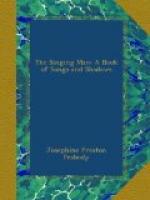Even for Music’s sake.
But most, his music whose beloved name
Forever writ in water of bright tears,
Wins to one grave-side even the Roman years,
That kindle there the hallowed April flame
Of comfort-breathing violets. By that shrine
Of Youth, Love, Death, forevermore the same,
Violets still!—When falls, to leave no sign,
The arch of Constantine.
Most for his sake we dreamed. Tho’ not
as he,
From that lone spirit, brimmed with human
woe,
Your song once shook to surging overflow.
How was it, sovran dweller of the tree,
His cry, still throbbing in the flooded
shell
Of silence with remembered melody,
Could draw from you no answer to the spell?
—O
Voice, O Philomel?
Long time we wondered (and we knew not why):—
Nor dream, nor prayer, of wayside gladness
born,
Nor vineyards waiting, nor reproachful
thorn,
Nor yet the nested hill-towns set so high
All the white way beside the girdling
blue,—
Nor olives, gray against a golden sky,
Could serve to wake that rapturous voice
of you!
But
the wise silence knew.
O Nightingale unheard!—Unheard alone,
Throughout that woven music of the days
From the faint sea-rim to the market-place,
And ring of hammers on cathedral stone!—
So be it, better so: that there should
fail
For sun-filled ones, one blessed thing unknown.
To them, be hid forever,—and
all hail!
Sing
never, Nightingale.
Sing, for the others! Sing; to some pale cheek
Against the window, like a starving flower.
Loose, with your singing, one poor pilgrim
hour
Of journey, with some Heart’s Desire to seek.
Loose, with your singing, captives such
as these
In misery and iron, hearts too meek,
For voyage—voyage over dreamful
seas
To
lost Hesperides.
Sing not for free-men. Ah, but sing for whom
The walls shut in; and even as eyes that
fade,
The windows take no heed of light nor shade,—
The leaves are lost in mutterings of the loom.
Sing near! So in that golden overflowing
They may forget their wasted human bloom;
Pay the devouring days their all, unknowing.—
Reck
not of life’s bright going!
Sing not for lovers, side by side that hark;
Nor unto parted lovers, save they be
Parted indeed by more than makes the Sea.
Where never hope shall meet—like mounting
lark—
Far Joy’s uprising; and no memories
Abide to star the music-haunted dark:
To them that sit in darkness, such as
these,
Pour
down, pour down heart’s-ease.
Not in kings’ gardens. No; but where there
haunt
The world’s forgotten, both of men
and birds;
The alleys of no hope and of no words,
The hidings where men reap not, though they plant;
But toil and thirst—so dying and so born;—
And toil and thirst to gather to their want,
From the lean waste, beyond the daylight’s
scorn,
—To
gather grapes of thorn!




